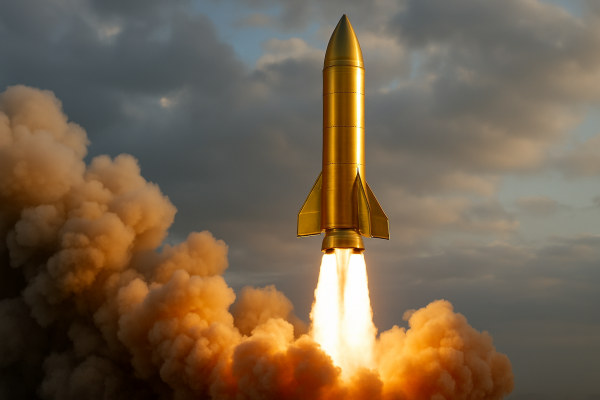August 29th, 2022 | 10:43 CEST
Germany is turning into a desert: Desert Gold, BASF, K+S - Opportunities in the agricultural and gold sector
Germany is experiencing the best summer in decades, causing many to cheer, whilst farmers are becoming increasingly desperate. Not that we wish for bad weather, no - it is simply a matter of balancing the climate because a certain amount of precipitation at the right time is vital for our soils. However, the number of rainy days this summer could be counted on one hand, and some areas did not receive any precious water at all. Farmers will therefore harvest an average of 30% less, with some fruits threatening total failure. The problem has less to do with climate change and more with desertification, which has been caused by human intervention for centuries.
time to read: 4 minutes
|
Author:
André Will-Laudien
ISIN:
DESERT GOLD VENTURES | CA25039N4084 , BASF SE NA O.N. | DE000BASF111 , K+S AG NA O.N. | DE000KSAG888
Table of contents:

"[...] One focus will be on deposits near the surface. These would be good arguments for a quick production decision using the low-cost heap leaching method. [...]" Brodie Sutherland, CEO, Tocvan Ventures
Author
André Will-Laudien
Born in Munich, he first studied economics and graduated in business administration at the Ludwig-Maximilians-University in 1995. As he was involved with the stock market at a very early stage, he now has more than 30 years of experience in the capital markets.
Tag cloud
Shares cloud
Desertification since Roman times
In Roman times, the area of what is now Germany was a large swamp and floodplain, and the moisture in the soil reached great depths. The valleys were marshy and simply not passable. Since then, land dwellers have increasingly drained the predominant sponge-like soil, and the extracted water is now part of the oceans. The earth has become increasingly deserted and compressed. When it rains today, only 20% of the water is absorbed, as it does not reach deeper soil layers due to a lack of permeability, resulting in floods and sudden deluges, like in the Ahr valley in 2021. The agricultural year 2022 is headed "Drought 3.0" because, since the tremendous drought of 2018, the water is no longer arriving where it is urgently needed. With winter wheat and rapeseed, agriculture still had success, but with corn, sugar, potatoes and other arable crops that are now ripening, things look very different in the drought year 2022. Crops important for feeding animals, in particular, are likely to produce very low yields in the current year, according to the German government's 2022 harvest report.
BASF - High momentum in the Agricultural Solutions division
Away from the traditional chemical business, the BASF Group has built up an interesting sector for agriculture in recent years through the acquisition of Bayer. Just how important this commitment is is demonstrated by the constantly falling yields per hectare worldwide caused by water shortages and pests.
A crucial tool for "Better Yields" are innovations from the fields of breeding, seeds, crop protection and digitalization. Nowadays, however, these innovations must not only ensure high yields and guarantee quality but also contribute to sustainability. BASF actively supports the goals of the EU's Common Agricultural Policy (CAP). Since 2013, the Company has been working with farmers and independent experts from nature conservation and environmental protection in the BASF Farm Network to find sustainable solutions. The goal is to increase biodiversity without losing fertile farmland, which is essential for food production.
The Agricultural Solutions business unit is running very strongly at the halfway point of 2022, with sales up 21.8% to EUR 5.86 billion. Operating results were also up more than 20%. However, BASF shares continue to suffer from the gas Sword of Damocles. Currently trading at EUR 40.90, it is not far from the 3-year low of EUR 38.50. In the long term, the dividend stock is far too cheap.
Desert Gold Ventures - Searching for desert gold
The Canadian explorer Desert Gold Ventures (DAU) knows its way around dry soils. In the immediate vicinity of large mining companies such as Allied Gold, Barrick and Endeavour, the latest drilling in the Barani East zone has already yielded discoveries of over 12.4 g/t over 45 meters. A detailed review of the metallurgy and mineability of the gold oxide resource, starting with the higher grade Barani East deposit, is underway.
CEO Jared Scharf is convinced that he will be able to provide proof in the coming months that a mining operation on the 440 sq km SMSZ project promises to be highly economically successful. In 2022, a total of 20,000 meters of drilling will be carried out for this purpose. Major B2 Gold is already very successful in Mali with the Fekola mine, producing 567,795 ounces of gold in 2021 at low operating costs of only USD 449 per ounce. That suggests a favorable environment in the West African nation, which could see more political stability in the medium term through job creation.
Desert Gold shares trade in Canada and Germany. As with all explorers, the stock currently trades at the lower end of the 12-month range of CAD 0.06 to 0.19. Recently, there was again strong interest in the share with +20% to just under 10 cents, a sign that possibly more good drill results are forthcoming.
K + S - On a good course, thanks to sanctions
Kali & Salz AG (K+S) has been one of the crisis winners because while standard DAX shares have fallen by an average of 20% since November 2021, K+S has staged a gigantic rally in the same period. On the one hand, there were the significantly rising potash prices, and on the other hand, the sanctions against Russian and Belarusian potash and salt producers.
The share price peaked at EUR 36.40 in April 2022, an increase of 200% on the summer prices of 2021. In the meantime, the share price consolidated downwards by almost 50%, supported by the recently published half-year figures. In the first half of 2022, revenues rose by 94.8% to EUR 2.72 billion, while pre-tax profit improved from EUR 376 million to EUR 963 million. K+S benefited primarily from the sharp rise in selling prices, while sales volumes fell slightly. Similar to other raw materials, the world market is currently lacking Russian supply volumes, and a complete return to the market is probably doubtful even after the end of the war.
Meanwhile, K+S drastically reduced its net financial liabilities by 38.8%, thus increasing its equity ratio from 47.9% to 65.2%. For the full year, the Company now expects EBITDA of between EUR 2.3 billion and EUR 2.6 billion, factoring in a 25% drop in gas availability and massively higher gas costs. From 2023 onwards, LNG supplies could slowly close the gas gap for the group, but costs are likely to remain high. The stock is now cheap again, with a 2023 P/E ratio of 4.1 and a P/S ratio of 0.8. Collect shares between EUR 21 and 24 for the long-term portfolio.
The price increases in the raw materials sector have also weighed on the agricultural industry. Nevertheless, the demand for AgriTech has grown noticeably. The water shortage due to the ongoing droughts is becoming a long-term challenge here. Investors should always ensure a balanced risk-reward profile in their portfolio. This includes investing in gold and commodity companies.
Conflict of interest
Pursuant to §85 of the German Securities Trading Act (WpHG), we point out that Apaton Finance GmbH as well as partners, authors or employees of Apaton Finance GmbH (hereinafter referred to as "Relevant Persons") may hold shares or other financial instruments of the aforementioned companies in the future or may bet on rising or falling prices and thus a conflict of interest may arise in the future. The Relevant Persons reserve the right to buy or sell shares or other financial instruments of the Company at any time (hereinafter each a "Transaction"). Transactions may, under certain circumstances, influence the respective price of the shares or other financial instruments of the Company.
In addition, Apaton Finance GmbH is active in the context of the preparation and publication of the reporting in paid contractual relationships.
For this reason, there is a concrete conflict of interest.
The above information on existing conflicts of interest applies to all types and forms of publication used by Apaton Finance GmbH for publications on companies.
Risk notice
Apaton Finance GmbH offers editors, agencies and companies the opportunity to publish commentaries, interviews, summaries, news and the like on news.financial. These contents are exclusively for the information of the readers and do not represent any call to action or recommendations, neither explicitly nor implicitly they are to be understood as an assurance of possible price developments. The contents do not replace individual expert investment advice and do not constitute an offer to sell the discussed share(s) or other financial instruments, nor an invitation to buy or sell such.
The content is expressly not a financial analysis, but a journalistic or advertising text. Readers or users who make investment decisions or carry out transactions on the basis of the information provided here do so entirely at their own risk. No contractual relationship is established between Apaton Finance GmbH and its readers or the users of its offers, as our information only refers to the company and not to the investment decision of the reader or user.
The acquisition of financial instruments involves high risks, which can lead to the total loss of the invested capital. The information published by Apaton Finance GmbH and its authors is based on careful research. Nevertheless, no liability is assumed for financial losses or a content-related guarantee for the topicality, correctness, appropriateness and completeness of the content provided here. Please also note our Terms of use.




